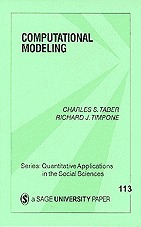Computational Modeling
no information available
Computational modelling allows researchers to combine the rich detail of qualitative research with the rigour of quantitative and formal research, as well as to represent complex structures and processes within a theoretical model. After an introduction to modelling, the authors discuss the role of computational methods in the social sciences. They treat computational methods, including dynamic simulation, knowledge-based models and machine learning, as a single broad class of research tools and develop a framework for incorporating them within established traditions of social science research. They provide a concise description of each method and a variety of social science illustrations, including four detailed examples. Common to most of these methods is a straightforward underlying approach: develop a process theory, express this theory as a computer program, and simulate the theory by running the program. The book concludes with a discussion of ways to validate computational models. ... Read more Read less











